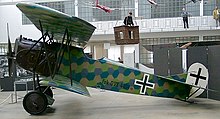Lozenge (shape) (original) (raw)
From Wikipedia, the free encyclopedia
Quadrilateral with sides of equal length
"⟡" redirects here. For the extended play, see Mujuk.
| ◊ | |
|---|---|
| Lozenge | |
| In Unicode | U+25CA ◊ LOZENGE (◊, ◊) |
| Related | |
| See also | U+2311 ⌑ SQUARE LOZENGEU+29EB ⧫ BLACK LOZENGEU+25C8 ◈ WHITE DIAMOND CONTAINING BLACK SMALL DIAMOND |
A lozenge ([1] LOZ-inj; symbol: ◊), often referred to as a diamond, is a form of rhombus. The definition of lozenge is not strictly fixed, and the word is sometimes used simply as a synonym (from Old French _losenge) for rhombus. Most often, though, lozenge refers to a thin rhombus—a rhombus with two acute and two obtuse angles, especially one with acute angles of 45°.[2] The lozenge shape is often used in parquetry (with acute angles that are 360°/n with n being an integer higher than 4, because they can be used to form a set of tiles of the same shape and size, reusable to cover the plane in various geometric patterns as the result of a tiling process called tessellation in mathematics) and as decoration on ceramics, silverware and textiles. It also features in heraldry and playing cards.
The lozenge motif dates from the Neolithic and Paleolithic period in Eastern Europe and represents a sown field and female fertility.[3] The ancient lozenge pattern often shows up in Diamond vault architecture, in traditional dress patterns of Slavic peoples, and in traditional Ukrainian embroidery. The lozenge pattern also appears extensively in Celtic art, art from the Ottoman Empire, and ancient Phrygian art.[4]
The lozenge symbolism is one of the main symbols for women in Berber carpets.[5]Common Berber jewelry from the Aurès Mountains or Kabylie in Algeria also uses this pattern as a female fertility sign.
In 1658, the English philosopher Sir Thomas Browne published The Garden of Cyrus, subtitled The Quincunciall Lozenge, or Network Plantations of the Ancients, in which he outlined the mystical interconnection of art, nature and the universe via the quincunx pattern. He also suggested therein that ancient plantations were laid out in a lozenge pattern.[6]
Lozenges appear as symbols in ancient classic element systems, in amulets, and in religious symbolism. In playing cards, the symbol for the suit of diamonds is a lozenge.
Lozenge (subtotal) key on a Walther Multa 32 calculator keyboard, c. 1970
On equipment, especially calculators, the lozenge is used to mark the subtotal key. It is standardized in ISO 7000[7] as symbol ISO-7000-0650 ("Subtotal"). In a similar fashion, the square lozenge (⌑), part of the BCDIC character set, was often used on tabulation listings to indicate second level totals in banking installations in the 1960s.[8]
The APL programming language uses the lozenge, called diamond, as statement separator.
A Fokker D.VII shows a four-color lozenge camouflage
During the First World War, the Germans developed lozenge camouflage (German: Lozenge-Tarnung).[9] This camouflage was made up of colored polygons of four or five colors. The repeating patterns often used irregular four-, five- and six-sided polygons, but some contained regular rhombi or hexagons. Because painting such a pattern was very time-consuming, and the paint added considerably to the weight of the aircraft, the pattern was printed on fabric. This pre-printed fabric was used from 1916 until the end of the war, in various forms and colours.
Several flags feature lozenges, including the Flag of Brazil, which contains a yellow lozenge at the center. One official flag of Bavaria is entirely made of blue and white lozenges.
Several emblems feature lozenges, including the Emblem of Uttarakhand, one of the twenty-eight states of India.
The lozenge in heraldry is a diamond-shaped charge, usually somewhat narrower than it is tall. A mascle is a voided lozenge—that is, a lozenge with a lozenge-shaped hole in the middle—and the rarer rustre is a lozenge containing a circular hole. A field covered in a pattern of lozenges is described as lozengy; a similar field of mascles is masculy.
In axiomatic set theory, the lozenge refers to the principles known collectively as the diamond principle.
Cough tablets have taken the name lozenge, based on their original shape. According to the Oxford English Dictionary the first use of this sense was in 1530.
In Finland, the lozenge is associated with salmiak, through Apteekin Salmiakki. Thus, the lozenge is commonly called salmiakkikuvio "salmiak shape". The pattern is often used even if the candy is not actually lozenge-shaped.
In the Finnish military, the lozenge symbol is used in the insignia of conscripts undergoing officer training to signify their rank and progress. Conscript Officer Students, who are still in the early stages of their training, wear an insignia with one lozenge.[10] As they advance in their training, they become Conscript Officer Candidates, identified by an insignia with two lozenges. This progression marks their nearing completion of officer training, with the lozenge serving as a clear visual indicator of their status.
WWII "ruptured duck" Honorable Discharge Emblem lozenge
To implement 10 U.S.C 773, the Secretary of the Navy has prescribed the following distinctive mark for wear by members of military societies which are composed entirely of honorably discharged officers and enlisted personnel, or by the instructors and members of duly organized cadet corps.
"The distinctive mark will be a diamond, 3+1⁄2 inches long by 2 inches wide, of any cloth material. A white distinctive mark will be worn on blue, green, or khaki clothing; and a blue distinctive mark will be worn on white clothing."[_citation needed_]
"The distinctive mark will be worn on all outer clothing on the right sleeve, at the point of the shoulder, the upper tip of the diamond to be 1⁄4 inch below the shoulder seam."[_citation needed_]
The lozenge is used in the Army, Marine Corps, and Air Force on the insignia of their respective first sergeants. It is also used in the cadet programs of Army ROTC, Army and Marine Corps Junior ROTC, and the Civil Air Patrol as rank insignia of cadet officers corresponding to the military pay grades of O-4 to O-6 (Cadet Major, Cadet Lieutenant Colonel, and Cadet Colonel).
Girl Singing by Frans Hals, from about 1628, is an example of a painting in lozenge format.
Lozenge is the term used to identify the format of a two-dimensional work of art, typically a parallelogrammatic painting on a canvas, panel, or paper support, that hangs as if from one of its corners. An example is Girl Singing by Frans Hals.[11]
In modal logic, the lozenge expresses that there is "possibility". For example, the expression ◊ P {\displaystyle \lozenge P} 

The lozenge (technically a mascle) can be used on public roadways in the United States and Canada to mark a specific lane for a particular use. The lane will usually be painted with a lozenge at a regular interval, and signage will be installed to indicate the restrictions on using the lane. This marking is most often used to denote high-occupancy vehicle lanes or bus lanes, with accompanying signage reading "◊ HOV LANE" or "◊ BUS LANE" and giving the requirements for a vehicle to be accepted. Prior to 17 January 2006, lozenges could also be used to mark bicycle-only lanes, often in conjunction with a bicycle icon.[12]
Starting in August 2023 on a four-years trial in France, a white lozenge on blue background reserves lanes to car-sharing vehicles (at least one passenger besides the driver).
In Japan and South Korea, a lozenge marked in white paint on the road indicates an upcoming uncontrolled pedestrian crossing. Similarly, in New Zealand a lozenge marked in white paint on the road may be placed to indicate an upcoming pedestrian crossing. [13]
In the United Kingdom, lozenges are used on tramway signs. For instance, speed limits are shown as a black lozenge on a white background, containing the speed limit in kilometres per hour.[14]
In many parts of Europe, traffic from the right has right of way at all junctions, unless otherwise stipulated. A yellow lozenge is used (typically on major routes) to indicate that the rule does not apply to the current route.
A hollow lozenge is also used in the signage of waterways[_where?_] to identify a hazard. A cross is placed in the lozenge, dividing it in four, to mark a restricted area.[15]
Square lozenge (Pillow symbol)
[edit]
A similar shape, ⌑, with concavely curved edges instead of straight lines and oriented such that its edges lie up, down, left and right, is defined in the Miscellaneous Technical Unicode block as a square lozenge. It is used in travel agencies, where it appears on the specialist keyboards used with booking terminals, where it has the familiar name, the pillow symbol.[16] In the 1960s, it was used in banking and for other purposes.[8]
In Unicode, the lozenge is encoded in multiple variants:
- U+22C4 ⋄ DIAMOND OPERATOR (⋄, ⋄, ⋄)
- U+25CA ◊ LOZENGE (◊, ◊)[17]
- U+2662 ♢ WHITE DIAMOND SUIT[a]
- U+2666 ♦ BLACK DIAMOND SUIT (♦, ♦)[b]
- U+27E0 ⟠ LOZENGE DIVIDED BY HORIZONTAL RULE
- U+27E1 ⟡ WHITE CONCAVE-SIDED DIAMOND
- U+29EB ⧫ BLACK LOZENGE (⧫, ⧫)
- U+2B27 ⬧ BLACK MEDIUM LOZENGE
- U+2B28 ⬨ WHITE MEDIUM LOZENGE
- U+2B2A ⬪ BLACK SMALL LOZENGE
- U+2B2B ⬫ WHITE SMALL LOZENGE
- U+25C6 ◆ BLACK DIAMOND
- U+25C7 ◇ WHITE DIAMOND
- U+2756 ❖ BLACK DIAMOND MINUS WHITE X
- U+20DF ⃟ COMBINING ENCLOSING DIAMOND
- U+1CC8D INVERSE BLACK DIAMOND[18]
The lozenge is present in DOS code page 437 (at character code 4)[19] and Mac-Roman (at character 215 = 0xd7). The AMS-LaTeX command for the lozenge is \lozenge ( ◊ {\displaystyle \lozenge } 
Other related unicode characters include:
- U+2311 ⌑ SQUARE LOZENGE
- U+2726 ✦ BLACK FOUR POINTED STAR
- U+2727 ✧ WHITE FOUR POINTED STAR
In IBM 026 punched card code the pillow-shaped square "lozenge" ⌑ is (12-8-4).[20][8]

Lozenge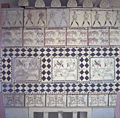
Phrygian art, 7th Century BC
Cucuteni-Trypillian figurine with sown field pattern
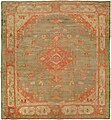
Khatha, sacred Yantra amulet from Thailand



Talisman design from an 18th-century French grimoire
Arabic manuscript China, 16th Century
Charlemagne coins, denier or denaro c. 771–793

Traditional sown field pattern of Western Ukraine

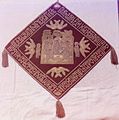








National flag of Belarus with sown field pattern
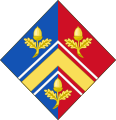
Lozenge-shaped coat of arms is reserved for women
Diamond vault in German architecture
_Rune_-shaped designs (five-lozenges cross and heart) on the gable of Ledringhem's church
Sown fields in an open field system of farming- Parallelepiped, 3-D Lozenge
- Petrosomatoglyph, lozenges as symbols in prehistory
^ The term 'white' is perhaps a misnomer, since colour is font choice. A more accurate description might be 'outline'.
^ The term 'black' is perhaps a misnomer, since colour is font choice. A more accurate description might be 'solid'.
^ "lozenge". Macmillan English Dictionary for Advanced Learners.
^ "Lozenge - from Wolfram MathWorld". Mathworld.wolfram.com. 2015-07-22. Retrieved 2015-08-11.
^ Welters, Linda (1999). Folk dress in Europe and Anatolia: beliefs about protection and fertility. Berg Publishers. pp. 16–21. ISBN 1-85973-282-8.
^ Sams, Gilbert (1994). The early Phrygian pottery. Science Press. p. 151. ISBN 0924171189.
^ Berber Carpets of Morocco: The Symbols Origin and Meaning, by Bruno Barbatti, ACR Edition, ISBN 978-2-86770-184-9.
^ Moore, Charles (1988). The Poetics of Gardens. The MIT Press. p. 161. ISBN 0262631539.
^ ISO 7000 - Graphical symbols for use on equipment
^ a b c Mackenzie, Charles E. (1980). Coded Character Sets, History and Development (PDF). The Systems Programming Series (1 ed.). Addison-Wesley Publishing Company, Inc. p. 99. ISBN 978-0-201-14460-4. LCCN 77-90165. Archived (PDF) from the original on May 26, 2016. Retrieved August 25, 2019.
^ "German Lozenge Camoflage". Wwiaviation.com. Archived from the original on 6 March 2016. Retrieved 2015-08-11.
^ "Military ranks". Puolustusvoimat. Retrieved 2024-08-28.
^ Hofstede de Groot, Cornelis (with the assistance of Kurt Freise and Dr Kurt Erasmus); A Catalogue Raisonné of the Works of the Most Eminent Dutch Painters of the Seventeenth Century, based on the work of John Smith, Volume III; translated from the German and edited by Edward G. Hawke; Macmillan & Co., London; 1910; pp. 32, 33. (On line at archive.org, retrieved 23 June 2024: https://archive.org/details/catalogueraisonn03hofsuoft/page/32/mode/2up?view=theater)
^ "Introduction - MUTCD 2009 Edition - FHWA". United States Department of Transportation. Retrieved 2018-05-20.
^ "Sharing The Road With Pedestrians". NZ Transport Agency. Retrieved 2022-07-08.
^ "Know Your Traffic Signs" (PDF). Department for Transport. 2007. Retrieved 2018-05-20.
^ "Aids to Navigation Explained". marine-movers.com. Archived from the original on 2017-07-27.
^ Apollo for Travel Professionals (PDF). Galileo International LLC). 2007. p. 1.4. Retrieved 1 June 2020.
^ "Geometric Shapes" (PDF). Unicode.org. Retrieved 2015-08-11.
^ "Symbols for Legacy Computing Supplement" (PDF). Unicode.org. Retrieved 2024-12-22.
^ Valtanen, Esko (1990). DOS-OPAS. Teknolit. p. 649. ISBN 952-90-1220-9.
^ "The IBM 026 Key Punch". Columbia University. 2003-12-31. Retrieved 2018-05-20.
 The dictionary definition of lozenge at Wiktionary
The dictionary definition of lozenge at Wiktionary

